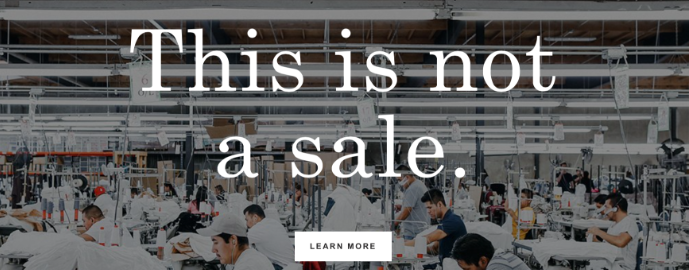
The term “Black Friday” was never intended as a positive. Coined by the Philadelphia Police Department in response to the “massive traffic jams and overcrowded sidewalks” caused by post-Thanksgiving shoppers, the term invokes Black Thursday and Black Monday–days on which the bottom fell out of the stock market.
And in many cases, the best deals aren’t even available on Black Friday. Most companies start discounts earlier in the week, and those discounts last throughout the holiday season. Plus, as more business shifts to online shopping, Cyber Monday has become one of the biggest days of the year; direct-to-consumer brands make approximately 20% of their annual sales on this day alone.
For many consumers, Black Friday has really become just one more way to feed the US overconsumption problem.
Alternatives to Black Friday
I’d like to propose a rethinking of Black Friday. Let’s take a look at what a few companies have chosen to do with their Black Friday sales in order to reshape the day’s purpose.
Everlane is an example of a company that’s decided to take Black Friday in a different direction. In 2014, it started a new tradition: the Black Friday Fund. The fund sets aside a percentage of sales to help improve Everlane’s workers’ quality of life. The idea it funds changes each year. Over the last four years Everlane has:
- 2017—raised $160,000 to provide a year’s worth of fresh meals to workers in the company’s Saitex demin factory – while also partnering with Freight Farms to provide an enclosed greenhouse to grow fresh food. Saitex agreed to match the donation dollar for dollar
- 2016—provided 8,000 helmets to its factory workers in Vietnam, where approximately 80% of its workers ride mopeds to work, often without helmets
- 2015—created a wellness program for its factory workers in LA, including free English classes, groceries and health care
- 2014—funded solar panels for its Chinese silk factory workers’ apartments
Another big difference is the company’s lack of a typical Black Friday sale. Because Everlane prices its products at the cost of production throughout the year, later markdowns aren’t needed. As the company notes, “Most brands keep prices artificially high, then use sales to create a false sense of value.” The fact that its Black Friday Fund has grown every year demonstrates the positive customer response, even without a typical sale.
Other companies have also stood up to the typical Black Friday sales and chaos. REI isn’t open on Black Friday, and instead encourages its customers to spend time outside. In 2016, Patagonia announced that on Black Friday it would donate 100% of its sales to environmental grassroots nonprofits. It made 10 million dollars on Black Friday alone, 5 times its goal.
Growing Customer Support to Black Friday Consumption
Customers of socially, ethically or environmentally conscious brands respond well to alternative Black Friday ideas. This isn’t entirely surprising, as this kind of customer is already supporting a companies that are transforming business as usual. But Patagonia’s 10 million dollars makes a statement, demonstrating that more and more consumers are interested in brands like Patagonia and Everlane.
It can be tough to strike a balance. For some, Black Friday is an opportunity to buy a Christmas gift for a loved one that they might not otherwise be able to afford. But, as Everlane’s business model shows, if companies priced products more appropriately throughout the year, consumers would have the ability to buy the product at any time.
The retail industry has been slow to accept this change, but consumers can help to push these new ideas. Reducing consumption, spending money during the holidays at socially and ethically responsible companies, or participating in Small Business Saturday, a tradition started in 2010 to promote shopping locally during the Thanksgiving holiday weekend can drive change in the retail sphere.
In the words of Marie Kondo, “People cannot change their habits without first changing their way of thinking.” It’s safe to say that Black Friday could use some serious rethinking.
